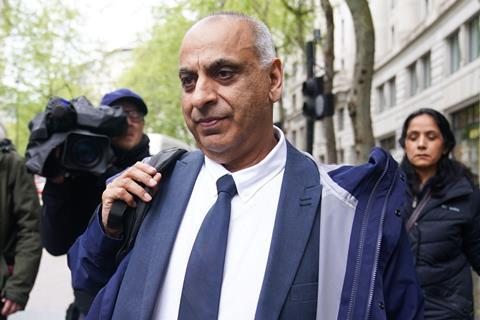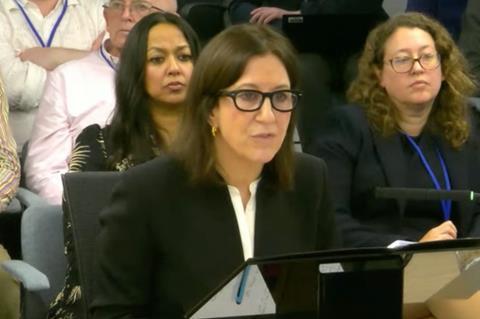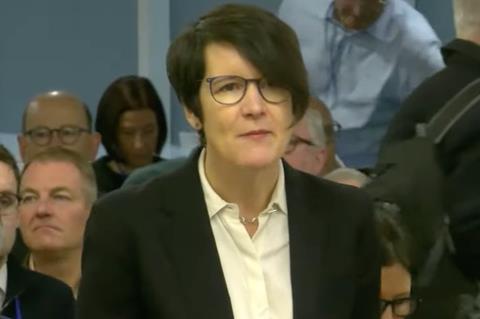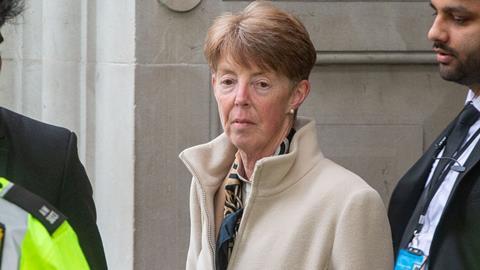Yesterday featured closing submissions from the lawyers representing victims. Today is the turn of the lawyers for the Post Office, Paula Vennells and Gareth Jenkins
Read yesterday's updates from the inquiry here
12pm: Wrapping up, Leek says Vennells fully understands the strength of feeling that people have about her. She understands that apologies are difficult to hear and knows that any apology offers little comfort to those affected.
Leek adds: ‘She cannot, and does not try to hide from the fact that whilst CEO she did not manage to uncover the truth about the extent of the bugs, errors and defects in Horizon. This is a matter of deep and constant regret to Miss Vennells, as is the fact that the convictions of the sub-postmasters were not overturned sooner.
‘Miss Vennells simply did not receive the information which she ought to have been given by her senior team whom she trusted and to whom she delegated responsible roles… Miss Vennells still does not know why key information was not passed on to her and explained. She believed her senior team and general counsel to be working hard and doing their best to investigate the sub-postmasters’ complaints in good faith. She had faith in them and as far as she was concerned, had good working relationships with them. She is devastated by the fact that information was not shared with her. She has no desire to point the finger at others nor to speculate as to why information was not shared.’
Leek concludes by saying there has been no evidence to show that Vennells acted in bad faith and that she wanted to do right by the sub-postmasters.
11.55am: Leek says that throughout her time as chief executive, Vennells made use of ‘highly reputable’ external advisers. As a non-lawyer, she did not seek to reach her own conclusions on legal advice but ‘preferred, as she ought to do, to take advice from experts’.
This, it is suggested, applied to the Post Office’s approach taken to the Bates litigation.
'A CEO could and should not be expected to add value in relation to questions of law on which quite properly the general counsel took the lead with Miss Vennells and the board receiving appropriate briefings.'
11.50am: Leek lists examples of lawyers for the Post Office who failed to flag up issues with expert evidence or to acknowledge potential conflicts when they reviewed existing cases.
She adds: ‘Miss Vennells was neither wilfully blind, as suggested by core participants, nor did she close her eyes. She trusted her general counsel. She was advised by Miss Crichton that the right legal response to the disclosure issues was to conduct a review of past cases, to ensure that Post Office complied with its disclosure duties… as a non-lawyer, Miss Vennells could not have been expected to have understood the significance of an unsafe witness and was entitled to rely on her general counsel, [external advisers] Cartwright King and Brian Altman KC to ensure that Post Office was responding in an appropriate manner.’
Leek says the legal advice to the board was 'inadequate' and that Vennells wrongly believed she was getting the full picture.
11.30am: More on the Clarke Advice received in 2013 which threatened to undermine so many prosecutions if widely known about. The advice was only received by lawyers Crichton, Wilson, Hugh Flemington and Andrew Parsons and not sent to the board.
Leek says Crichton ‘did not set out in writing anywhere a complete or accurate summary of the substance of Mr Clarke’s advice. It was her job to do so.’
Nor did Crichton’s successor Chris Aujard ever share the advice higher up the organisation.
Leek concedes that part of the advice was communicated to Vennells in 2013 'though in a way which was piecemeal, unstructured and incomplete'.
11.25am: Vennells received an email from Crichton in 2013 before another briefing with MPs in which the lawyer stated ‘nothing has emerged from the interim findings given to us by [forensic accountants] Second Sight which would point to specific convictions being unsafe’.
Vennells was also told that cases had been through the judicial process. These words made their way into the speaking note for the briefing.
Leek says this email is ‘characteristic of the clear messaging that Miss Vennells had been receiving and continued to receive from her general counsel and upon which she was entitled to rely’.
11.20am: Leek says Vennells was told by Susan Crichton that the Post Office approached prosecutions with the same rigour as the CPS, applying the Police and Criminal Evidence Act 1984 and the code for crown prosecutors. The documentary evidence she has since seen supports her recollection that she was given assurances that Post Office conducted prosecutions 'responsibly, through a structured and professional legal process'.
11.10am: More on the advice Vennells says she was told, in particular by in-house criminal solicitors Jarnail Singh (pictured below) and Rob Wilson. In the written submission, her lawyer says: 'Ms Crichton said that Mr Singh and Mr Wilson had told her that POL had won every prosecution and that it did not cross her mind to be suspicious: "if people are making that very absolute statement and they're lawyers and, again, this is with hindsight, you tend to think "Well, actually, they've been in the business a long time, they must know what they're talking about". Ms Vennells submits that a non-lawyer would be entitled to reach the same conclusion.'

11am: Leek moves on to the briefing Vennells received before she met with MPs in 2012 and gave them what proved to be inaccurate information.
Leek says: ‘Miss Vennells’ straightforward submission in this regard is that she was entitled to rely on an unequivocal statement to the board by the general counsel [Susan Crichton] for its factual accuracy. Miss Crichton had said at the board meeting in January 2012 “the business has also won every criminal prosecution in which it had used evidence based on the Horizon system’s integrity”. Miss Vennells had no reason to question this…. Miss Vennells now knows that the information was false. She still does not understand why Miss Crichton failed to give her accurate information but would not have considered that she needed to verify what she was being told by her general counsel.’
10.50am: Vennells' written closing statement makes repeated criticisms of lawyers for not giving her the full story or giving repeated assurances about the reliability of prosecutions. Her statement says that she was told that a prosecution case review was the appropriate legal step for POL to take and that it was being conducted by specialist lawyers. The statement goes on: 'If the lawyers engaged in the task made mistakes, failed to ask questions, failed to provide information, and became jaded and hardened to the SPM cases over time, it is difficult to identify what Ms Vennells, as a non-lawyer, could have done which would have achieved a better outcome.'
Leek continues this theme, telling the inquiry: 'The clear message being given both by legal and IT was that there was nothing to worry about.'
10.45am: Vennells' evidence earlier this year was that she trusted and was let down by colleagues. Now she is doubling down on that assertion.
Leek tells the inquiry: 'So far as Miss Vennells was aware, she had a competent head of IT and a competent general counsel on whom she believed she was entitled to rely.'

10.30am: The room has gone noticeably quieter as the biggest figure in this scandal has her final say. Leek says Vennells was given information which was 'incomplete or incorrect or which was not given at all'.
Leek adds: 'When witnesses have given recent evidence of matters relevant to Miss Vennells without there being supporting contemporaneous documents, this evidence should be approached cautiously. It is inevitable, having regard to the very human desire for self-preservation, that witnesses will now seek to distance themselves from Miss Vennells.'
This is going to be bombshell stuff, I suspect.
10.20am: Samantha Leek KC, the lawyer for former chief executive Paula Vennells (who is not here, by the way) is next up to speak. She refers to the 138-page statement provided by Vennells (which you can find here: SUBS0000071 - Closing Statement on Behalf of Paula Vennells | Post Office Horizon IT Inquiry). Leek adds: 'It is only by looking forensically at all of the documentation that a fair picture of Miss Vennells' actions can be seen.'
10.10am: Greaney goes into detail about how the Post Office has already changed much of its governance policies. She notes that the interim general counsel attends board meetings as standard now. This issue of the senior lawyer attending meetings was a crucial part of the inquiry evidence, when it emerged that then-GC Susan Crichton was locked out of a meeting in 2013 and could not present an update on prosecutions.
Greaney finishes with another apology to those affected by the Post Office scandal, and tells the inquiry that the organisation will be judged in the months and years to come not by its words but by its actions.
We take a quick break.
10am: Greaney acknowledges that senior executives did not even know the Post Office had a private prosecutorial function as late as 2012. These finally stopped in 2014 (although there has been a suggestion in recent weeks that two sub-postmasters have been under investigation for alleged shortfalls).
Greaney assures the inquiry the Post Office has no intention to carry out any of its own prosecutions again.

9.55am: Greaney says the Post Office failed to ensure that the Clarke Advice, which highlighted that key evidence from expert witness Gareth Jenkins was flawed, was shared among the organisation. But she suggests this was not a deliberate ploy by the lawyers.
She goes on: ‘There was a collective failure on the part of the then Post Office legal team to appreciate its full significance and inadequate processes were in place for sharing the substance of key legal advice with the board, rather than an attempt to prevent the advice being considered by the board.’
9.50am: Post Office lawyer Nicola Greaney KC admits the organisation was too focused on protecting the brand and junior staff did not feel able to speak up when they saw something was wrong. On executives, she adds: 'Important senior roles were occupied by individuals who regrettably lacked sufficient understanding of the obligations and responsibilities attached to those roles.'
9.45am: The Post Office lawyer (who we are just trying to identify) opens with a mea culpa: She says: 'The Post Office recognises that its actions have caused harm and suffering to postmasters, their families and to many others. I would like to start by reiterating Post Office’s apology for the damage that it has caused to every person who has been affected by the Horizon IT scandal.
'The Post Office says it has changed as an organisation and is appalled by the evidence that has been heard about the actions of the last 20 years. The reliance on Fujitsu, it adds, is a source of 'deep regret'.
9.30am: We are up and running for the final hearing day of the Post Office Inquiry. Yesterday featured closing submissions from the lawyers representing victims, and today is the turn of the lawyers for the Post Office, its former chief executive Paula Vennells and controversial expert witness Gareth Jenkins.




































